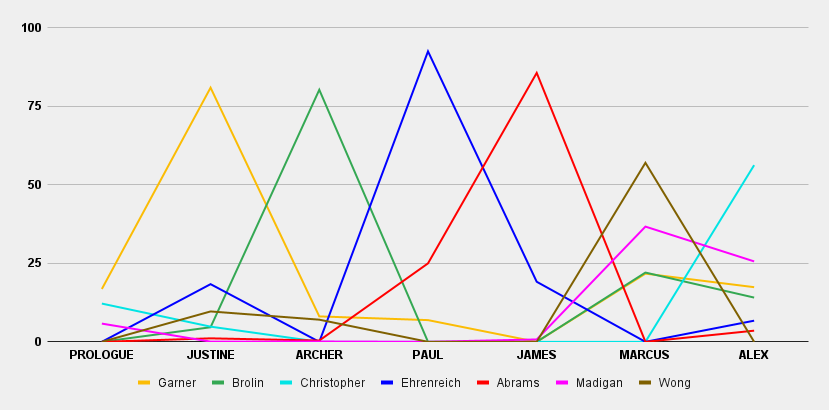Weapons
- Matthew Stewart

- Oct 28, 2025
- 2 min read
Julia Garner - 32:49 (25.54%)
Josh Brolin - 22:11 (17.27%)
Cary Christopher - 21:42 (16.89%)
Alden Ehrenreich - 19:07 (14.88%)
Austin Abrams - 17:12 (13.39%)
Amy Madigan - 14:45 (11.48%)
Benedict Wong - 11:47 (9.17%)
Before I delve into my Weapons data, I want to acknowledge that, since the STC mailing list has nearly doubled in size since my last post, this one is going out to my largest subscriber audience yet. I’m grateful to everyone who’s signed up (recently or not), and I guarantee more frequent posts over the next few months as I continue to tackle this year’s Oscar contenders.
As others have noted, Weapons’ multi-perspective plot structure does not necessarily make it Rashomonesque, as it has practically nothing else in common with the Japanese classic. Even through half a dozen focal shifts, the story of the missing Maybrook kids continually feels authentic because it’s presented entirely in third person. Rather than raise questions about what’s true and what’s not, the shifts serve to gradually fill in the gaps of the mystery until it’s legitimately solved.


Even without knowing Weapons’ screen time data, most viewers would unflinchingly categorize its whole cast as supporting, and I can’t find much fault with that. Still, no matter how strong the justification, use of the ensemble argument never fails to inspire me to counter.
In this case, I’d say Justine and Alex could be considered lead characters due in large part to the bookend positions of their narratively dominant chapters. The fact that Archer has more screen time than Alex doesn’t matter, especially given Alex’s status as the only focal character who knows the truth about the mystery from the beginning.
Boiling it down to basics, the boy and his teacher share the hero role in this good vs. evil story, respectively becoming the villain’s foil and target. She serves as the audience surrogate during (and often after) the world-building stage, while he ends up singlehandedly saving the day. The prologue even establishes that they are the most important characters, as they are the only ones the narrator names after she emphasizes that any Maybrook resident would retell the story the exact same way.
When it comes to categorizing this particular cast, screen time only matters in the context of the chapters. While we experience the story through six perspectives, it’s also true that the middle four segments are significantly less narratively crucial than the first and last. Again, the ensemble argument can legitimately be applied here, but I think there’s an equally legitimate way around it.





